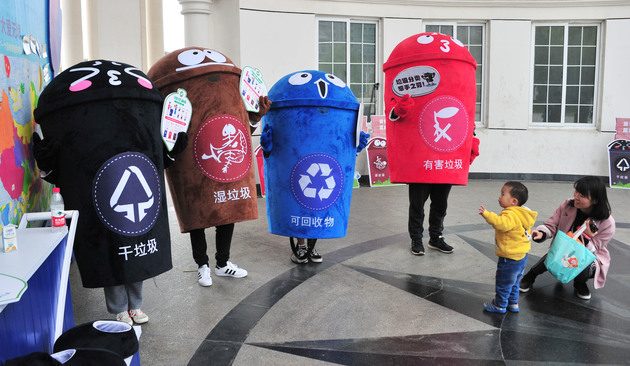June 21 (NBD) -- A flurry of people have found new job opportunities as the household garbage sorting regulations are to take effect starting July 1 in Shanghai.
In Shanghai, the first city in China to impose mandatory garbage classification rules, there emerge people taking orders online to sort household trash for residents.
With the surging need of garbage classification service, "I can earn as much as 10,000 yuan (1,460 U.S. dollars) a month now," said Li Mingzhe, one of the service providers.
By receiving orders via mobile apps, the workers provide door-to-door waste collection service for citizens.

Garbage sorting being promoted in Shanghai (Photo/Tuchong)
Needs for waste classification services rise
Released in late January, Shanghai's new regulations clarify the classification of four types of waste: dry garbage, wet garbage, hazardous waste and recyclables. In a city's guide of sorting trash, 104 kinds of garbage are listed under the four categories.
The complex waste categorization poses a challenge to all citizens who are asked to learn the proper way of garbage sorting within a short period of time.
Some citizens complained that the limited time for trash disposal also brings difficulty and the garbage houses in some buildings stay open only from 7 a.m. to 9 a.m. and 6 p.m to 8 p.m.
Therefore, an increasing number of people choose to order online waste collection services to deal with their trash.
It is noted that starting next month, individuals who fail to sort the trash will be fined up to 200 yuan, and 50,000 yuan for companies and institutions.
With the strict regulations, Shanghai aims to achieve its goal for garbage recycling within two years.
According to the government, by the end of 2020, the household garbage treatment capacity of the city will reach 32,800 tonnes each day, among which 7,000 tonnes of wet garbage will be recycled. The garbage recycling rate is expected to reach 35 percent.
Following in Shanghai's footsteps, Beijing stated that it is accelerating the legislation of household waste management. The coming regulations are expected to make clear the responsibility of individuals for waste classification, and fines for mixed disposal of trash.
Industrial chain of trash sorting expected to benefit
In fact, a raft of Chinese cities have promoted household garbage classification for years.
Beijing, Shanghai, Guangzhou, Shenzhen and Hangzhou pioneered garbage classification in 2000.
Statistics shows as of December 31 last year, 46 main cities have announced their plans for trash management. A total of 16 cities have issued local laws or regulations on household waste classification, and 26 cities have placed garbage classification regulations on the agenda.
On June 6, the country's authorities issued a national file for trash management, mentioning that the garbage classification mechanism will be completed in the 46 major cities by 2020 and will extend to all cities at the prefecture level and above by 2025.
Financial service company Guosen Securities believes garbage sorting will have positive impact on the whole industrial chain from equipment manufacturing, waste collection and transportation to waste disposal and recycling.
In the upstream, sanitation machine manufacturers will be the first beneficiary, and demand for trash sorting and transportation is predicted to surge. In the downstream, the garbage classification is to improve incineration efficiency of the related enterprises and to fuel the growth of the wet waste disposal market.
Email: gaohan@nbd.com.cn


 川公网安备 51019002001991号
川公网安备 51019002001991号





